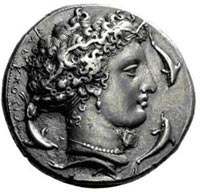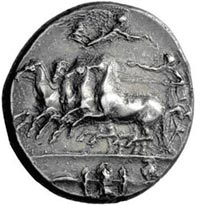Contents
Whether for the Art, Age or Beauty, there's great enjoyment in Collecting Greek Coins ...
Ancient Greek Coin collectors fall into three main categories
Those who appreciate the exceptional art on many of the coins.
Those that find the shear age of the coins fascinating and those who find the rarity of Greek coins appealing.
The art on Greek coins can be exceptionally beautiful and most Greek coin collectors often fit into this appreciating art category.
The standard of the art has never been replicated by any other mint and this is the great attraction for many collectors and numismatists.
Most scholars of ancient Greek coinage point to the Sicilian coinage of the fifth through third century BC as an artistic high point, while others look to the coinage of the Hellenistic monarchs, a fact captured in verse by Frank Sherman Benson's A Cabinet Of Greek Coins ...
BEHOLD portrayed in miniature, yet clear, the changing seasons of Hellenic art;
Fair spring-time, when dim haunting visions start forth into life, and forms divine appear;
Full, radiant summer, when a heaven-born skill achieves such height as man ne'ermore can gain;
Dear autumn of decay, wherein remain mere phantoms which a glimmering twilight fill.
Here too the Olympic pantheon displays pure, grand ideals of each dreaded god, or cherished goddess, or loved nymph enshrined.
With likeness too of many a king whose nod could empires shake.
Thus various-hued we find, a rich emblazonry of ancient days.
The age of ancient Greek coins is also a great attraction
Rarity is sought by many collectors, and collecting Greek coins offers many rarities along with art and age.
For this reason many collectors find ancient Greek coinage a much more interesting way to collect their rarities.
With some collectable Greek coins being minted over 2,600 years ago, they are among the rarest available. Tied into this attraction is the historical and economic importance of the coins.
Collecting Greek Coins is an absorbing and rewarding hobby.
The collector, collecting Greek coins, who wishes to delve into ancient Greek coinage is met with a few surprises when compared to collecting contemporary coins:
- There are usually no dates or mint marks on Greek coins.
- The coins are rarer in general and therefore the prices are higher.
- There's no set schemes or patterns to collect when collecting Greek coins, ie: you can't collect the equivalent of all George III Sovereigns in an album designed for the purpose.
Unlike collecting modern day coins, no set plan is actually needed when collecting Greek coins. Rather, a field of interest is more important and some example categories would be:
- Archaic period (or the very oldest Greek coins)
- Greek Coins with portraits on the obverse
- Gold and electrum Greek coinage
- Bronze coinage
- Greek Coins from a certain region or city.
Find something in collecting Greek coins, that interests you and read up on that subject.
You could also build a relationship with a knowledgeable dealer or numismatist, which is of great value in gaining assistance with acquisitions and to avoid pitfalls. Take your time and enjoy the experience of learning and collecting some of the most interesting coins ever produced.
Most Greek coins you will collect or examine can be handled safely.
It may seem wrong but there's little possibility of damaging a 2,000 year old bronze Greek coin. It's already been through a lot and you can hold it in your hand and examine it closely (just be careful not to scratch it).
Be aware that nearly all ancient Greek coins are either still buried or have been excavated and cleaned. Cleaning is an accepted practice and does not, in and of itself, ruin the value of the coin. That said, it's obvious that a bad cleaning will leave its mark and some collectors prefer toned coins, but then many also prefer recently cleaned ones.
Since collecting Greek coins can be expensive, it seems obvious that the beginner should start with bronze issues, which are normally lower in price and this practice is advocated by many.
You might agree with this way of thinking, but you should always only collect coins that interest you. If you find the coins you like too expensive, you have some options:
- Use layaway plans (for example, Forum Ancient Coins offers up to four months to pay for a coin on layaway)
- Select coins of a lower grade or condition
- Start with the least expensive Greek coins in the area that interests you.
It's always better to have one coin that you really like and are proud to own, than to have several coins that you care little for.
The novice Greek Coin Collector is advised to read a few books and to, buy the book before the coin.
Recommended Reading: read at least one of the two as an introduction :
- Jenkins, G., Ancient Greek Coins, Putnam, New York or
- Carradice, I, Greek Coins, British Museum Press, London.
Dating Greek Coins
To date a Greek coin, you need to know the start date for the era. For most Roman coins it is the start of the Emperors reign. Some other era start dates are :
- Seleucid Autumn - 312 BC
- Pompeian - 64 BC
- Caesarian Autumn - 49 BC
- Capitolias, Decapolis - 97 AD
- Neopolis, Samaria - 72 or 73 AD
- Dora, Samaria - 64/63 BC (variation on Pompeian)
- Provincial Arabia - 106 AD
- Philadelphia, Syria - 63 BC (variation on Pompeian)
- Chalcis, Chalcidice, Syria - 92 AD
- Leucas, Syria Autum - 37 BC
- Alexandria Troas - 300 BC
If the era started before the common era, to determine the common era (AD or CE) date, subtract the era start year from the date on the coin.
If the result is less than zero, determine the date before the common era (BC or BCE) by subtracting the date on the coin from the era start year and then adding one.
If the era started in the common era (AD or CE), add the start year to the date and then subtract one to determine the common era date.
![]() Electrum, a combination of Gold and Silver, was first minted in Asia Minor and actually stamped with a mark of value and ownership, but not circulated. The Lydians discovered how to separate the gold and silver that comprises electrum and shortly after that silver coinage spread throughout the Greek world.
Electrum, a combination of Gold and Silver, was first minted in Asia Minor and actually stamped with a mark of value and ownership, but not circulated. The Lydians discovered how to separate the gold and silver that comprises electrum and shortly after that silver coinage spread throughout the Greek world.
So; as can be seen, the diversity and variety in collecting Greek Coins will reward the collector with hours of happy research and rare fine art to admire on the coins they collect.



Leave a Reply
You must be logged in to post a comment.